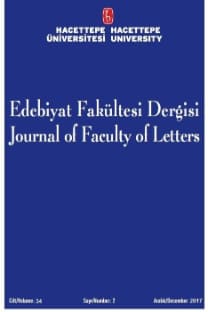John Millington Synge's Riders to the Sea in Terms of Epistemology
John Millington Synge's Riders to the Sea in Terms of Epistemology
___
- Anne, Bruce. Knowledge of the External World. London; New York: Routledge, 1991.
- Audi, Robert. Epistemology: A Contemporary Introduction to the Theory of Knowledge. London; New York: Routledge, 1998.
- Audi, Robert. "The Sources of Knowledge." The Oxford Handbook of Epistemology. Ed. Paul K. Moser. Oxford: Oxford UP, 2002. 70-94.
- Bailey, Alice. "From Intellect to Intuition - VII - Intuition and Illumination." 6 July 1998. 30 Apr. 2003 _____http:/A)easkund.helloyou.ws/netnews/bk/intellect/intel045.html>.
- Benson, Eugene. J.M. Synge. London: Macmillan, 1992. Brook, Andrew, and Robert J. Stainton. Knowledge and Mind: A Philosophical Introduction. Cambridge, Mass.: MIT, 2001.
- Davy, Daniel. "Tragic Self-Referral in Riders to the Sea" Assessing the Achievement of J.M. Synge. Ed. Alexander G. Gonzalez. Westport, Conn.: Greenwood, 1996.38-50.
- Durbach, Errol. "Synge's Tragic Vision of the Old Mother and the Sea." J.M. Synge: Four Plays. Ed. Ronald Ayling. Houndmills: Macmillan, 1992. 80-90.
- Gerstenberger, Donna. John Millington Synge. Boston: Twayne, 1990.
- Grene, Nicholas. Synge: A Critical Study of the Plays. Houndmills: Macmillan, 1985.Jacques Maritain Center. "The First Principles of Knowledge" 6 Aug. 2003 _____http://www.nd.edu/Departments/Maritian/etext/first20.htm>.
- Loftus, Elizabeth. Memory: Surprising New Insights into How We Remember and Why We Forget. New York: Ardsley, 1988.
- Montague, William Pepperell. The Ways of Knowing or the Methods of Philosophy. 6th ed. London: George Allen and Unwin, 1962.
- Pashler, Harold, and Mark Carrier. "The Flow of Information." Memory. Eds. Elizabeth Ligon Bjork, and Robert A. Bjork. San Diego: Academic, 1996. 3-29.
- Pohle, Nancy C, and Ellen L. Selover. "Awareness and Intuition." 26 Mar. 2003 _____http://www.innerself.com/miscellaneous/awareness.htm>.
- Pollock, L. John, and Joseph Cruz. Contemporary Theories of Knowledge. Lanham, MD: Rowman and Littlefield, 1999.
- Price, Alan Frederick. Synge and Anglo-Irish Drama. [London]: Methuen, 1961.
- Sekuler, Robert, and Randolp Blake. Perception. New York: McGraw-Hill, 1990.
- Sosa, Ernest. Knowledge in Perspective: Selected Essays in Epistemology. Cambridge:Cambridge UP, 1991.
- Synge, J.M. The Aran Islands. Ed. Robin Skelton. Oxford: Oxford UP, 1979. Synge, J.M. Riders to the Sea. Types of Drama: Plays and Essays. Compiled by Sylvan Barnet, Morton Berman, and William Burto. New York: Harper, 1993. 393-401.
- ISSN: 1301-5737
- Yayın Aralığı: 2
- Başlangıç: 1983
- Yayıncı: Emine Erdoğan Özünlü
Üsküp Alaca Camii Haziresi'ndeki şahideler
Kalecik'e bağlı bağcılıkla uğraşan on köyde bireysel ve kurumsal açıdan modernleşme eğilimleri
Tuğça POYRAZ, Birsen ŞAHİN, Gülay ARIKAN
John Millington Synge's Riders to the Sea in terms of epistemology
Ergenlik döneminde intihar algısı: lise son sınıf gençliği örneği
Demet ULUSOY, Nilüfer ÖZCAN DEMİR, Aylin GÖRGÜN BARAN
Göç ve yoksulluk alanlarında kentle bütünleşme eğilimi: Diyarbakır örneği
Kalecik'e Bağlı Bağcılıkla Uğraşan On Köyde Bireysel ve Kurumsal Açıdan Modernleşme Eğilimleri
Tuğça POYRAZ, Birsen ŞAHİN, Gülay ARIKAN
Beyin fırtınasında sosyal kimlik değişiminin üretkenlik üzerine etkisi
